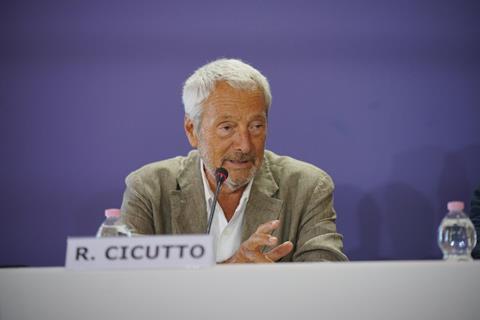
Venice Biennale president Roberto Cicutto will meet with climate activists on Friday (September 9), ahead of a protest march the following day before the film festival’s closing ceremony.
Cicutto, who presides over the Biennale organisation that runs the Venice Film Festival, reached out to activist group Venice Climate Camp, and will attend a workshop on Friday about art and the climate crisis. The event will be held at the campsite area, which is a 30-minute walk up the Lido from the film festival site.
A festival representative told Screen that Cicutto “is going to go because it is an initiative that deals with art and environment”.
The Climate Camp is a gathering of activists from September 7-11, who are meeting to share information about the climate crisis, and discuss next actions.
It has organised a Climate March on Saturday, September 10, the closing day of the festival. Starting at 2pm CET, activists will walk from the Piazzale Rava site of the camp towards the festival’s main Palazzo del Cinema venue.
Benedetta Argentieri, director of out-of-competition documentary The Matchmaker, will also visit the site this week, to give a talk on her work in the Middle East and how to address feminist issues in films.
This is the second year that the Climate Camp has taken place on the Lido concurrent with the film festival. In 2019’s inaugural edition, several hundred activists staged a sit-in on the red carpet in advance of the closing ceremony, which reportedly led to the dismissal of several police officers who allowed the protest to take place.
Spotlight
Volunteer Anna Clara is the press representative for the Camp, and told Screen that police have said “there is no way you’re going to do something like that again”. However, the activists still plan to get as close as they can to the Palazzo del Cinema venue.
The aims of the march are “to bring in a very public way all our claims about climate justice, on the red carpet,” said Clara.
The activists are not targeting the festival, she added, which they see as a useful platform for sharing climate justice-themed stories.
“There is a red carpet and all the cameras and spotlight are there,” said Clara. “There are movies and works of art that talk about the climate crisis; there’s no way I’m against such a festival.”
“[The festival’s] voices can be heard way more than us,” she added. “Actors, actresses – they might become activists, which would be great. But still, use your voice, use your visibility for climate issues.”
Clara is expecting 600 activists to attend the camp, with an increased percentage from the Veneto region. She noted that all festival attendees, including actors and filmmakers, are invited to participate in Saturday’s march.
The focus of the 2019 protest was around the admission of cruise ships and super-yachts to the Venice lagoon area, including during the festival. A ban on such vessels in the area came into force in August 2021 but there have still been several enormous craft moored just outside the restricted area, a short distance from the San Marco central district.
“This is a super touristic city,” said Clara. “Tourism has a social impact, but also a climate impact.”
The Biennale has made a significant effort in recent years to improve the environmental standing of its events. It achieved carbon neutrality – meaning it balances the carbon it emits into the atmosphere with that which it absorbs – for last year’s film festival, becoming one of the first festivals to do so. It has rolled out this measure across all Biennale events this year.
All festival attendees were also required to sign a form prior to this year’s festival committing to work towards carbon neutrality, in order to receive their accreditation.
The key figures at Venice publish a statement each year prior to the festival; in this year’s statement, Cicutto mentioned “significant investments in infrastructure and technological upgrades, not least those aimed at achieving carbon neutrality, a primary goal since the year 2020, which has already led to real-world results, such as the procurement of energy exclusively from green sources and economic offsets based on the collection of CO2 emissions data for all our events.”
On a page titled ‘environmental sustainability’ published in April of this year, he also wrote that the Biennale aims “to help contribute to the respect and conservation of Venice and its lagoon, a complex and highly delicate ecosystem that require special attention and care.”
“The world of art and culture today has a great opportunity – and a great responsibility – to take the lead in promoting the transition towards a model of sustainable development,” he added.

























No comments yet